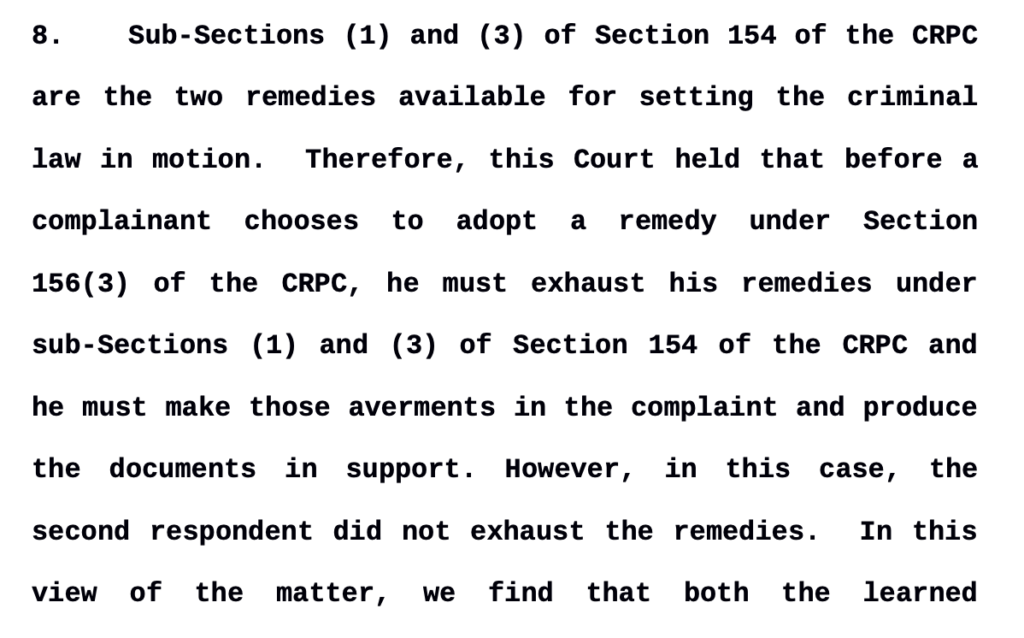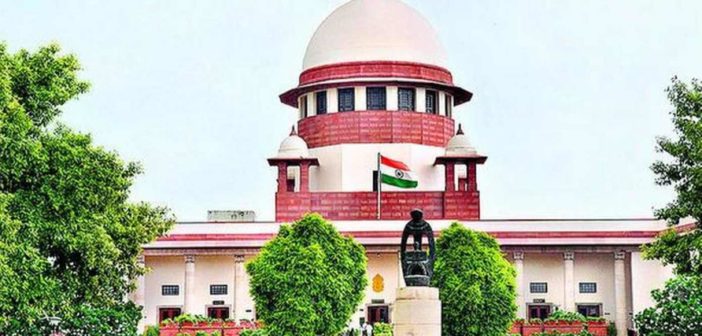In this edition of the Court Judgements review, we look at the Supreme Court’s order that the court orders in anticipatory bail/bail applications should be composite, one portion of the order cannot be segregated from the other, Allahabad HC’s order that to establish attempt to rape, prosecution must establish that the commission of offence has gone beyond preparation, that a magistrate cannot direct for registration of FIR, failing compliance with section 154 (1) & (3) of CrPC, among others.
Allahabad HC: To establish attempt to rape, Prosecution must establish that the commission of offence has gone beyond preparation
In Akash and Ors (Petitioners) vs. State of Uttar Pradesh and Ors (Respondents), the Allahabad High Court (HC) held that facts constituting aggravated sexual assault cannot be taken as also constituting attempt to rape, unless the prosecution establishes that the offence of attempt to commit rape has gone beyond preparation from the accused.
The facts of the case were that the petitioners were convicted by the Special Court for the charges of attempt to rape on minor girl under Indian Penal Code (IPC) and Protection of Children from Sexual Offences (POCSO) Act. On 10 November 2021, while a minor girl aged 11 years and her mother were walking back to their home, the petitioners offered a lift on a motorcycle to the minor girl. Since petitioners were known to the mother and the minor girl, her mother acceded to the offer and let her child go with the petitioners. After a certain distance, the petitioners grabbed her breasts, and one of them tried to drag and take her beneath a culvert, during which the string of her Pyjama broke. When the cries of the minor girl were heard, the witnesses passing by came to her rescue, and the accused ran away by pointing a country-made pistol.
The victim’s mother approached the father of one of the accused, who threatened her with life. Later, she approached the police to lodge an FIR, but no action was taken. Hence, she approached the special court under the POCSO Act. The same court convicted the petitioners for attempt to commit rape. The petitioners then approached the HC against this order.
The HC held that while the facts of the case in so far as the commission of aggravated sexual offences are evident, however they are not sufficient to establish offence of attempt to rape. To establish it, the prosecution must establish that it had gone beyond the stage of preparation from the accused, since the difference between preparation and actual attempt to commit an offence consists chiefly in the greater degree of determination. In the present case, grabbing of her breast and dragging her resulting in breaking of the string of Pyjama are not sufficient to constitute the alleged offence of attempt to rape. Accordingly, the HC remitted the matter back to the special court to issue fresh summons to the accused for the offences of sexual assault and aggravated sexual assault.

SC: The court orders in anticipatory bail/bail applications should be composite, one portion of the order cannot be segregated from the other
In Ritesh Kumar vs. The State of Bihar, the Supreme Court (SC) held that the anticipatory bail/bail orders given by the courts are composite orders, and that one part of the order cannot be isolated from the others.
The facts of the case are that while granting anticipatory bail to the petitioner, the HC imposed a condition that if a charge sheet is filed against the petitioner connecting him to the offence, the anticipatory bail will lose its effect and trial court shall take all coercive steps necessary to put the petitioner behind the bar. This specific condition was appealed in the SC by the petitioner.
The SC held that instead of imposing such a condition, the HC should have left it open for the trial court to decide whether the petitioner should be taken into custody or not, post the filing of the chargesheet. Accordingly, taking note that the chargesheet has now been filed against the petitioner, the SC ordered the petitioner to appear before the trial court on the question of bail, within a period of 3 weeks.
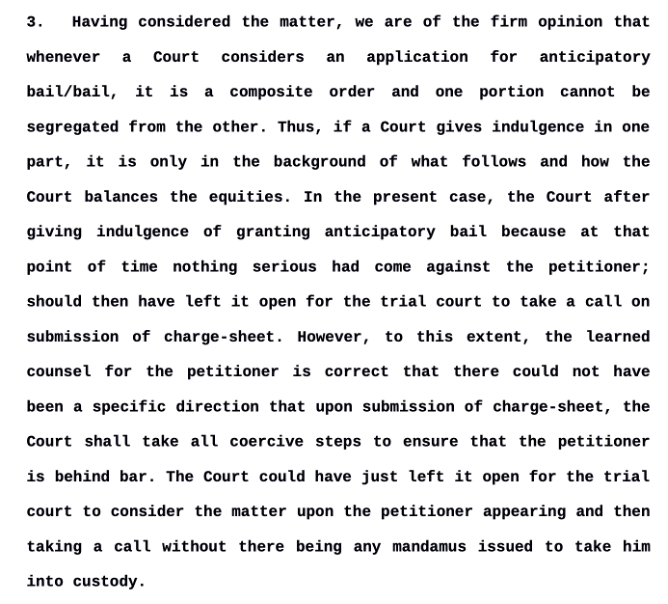
SC: Consent of the parties does not give jurisdiction to the HC to adjudicate matters
In Garden Reach Shipbuilders and Engineers Limited vs. GRSE Limited Workmens Union & Ors., the SC held that HCs do not have the jurisdiction to adjudicate matters based on the consent of the parties.
The facts of the case were that a writ petition was filed by employees seeking compassionate appointments from GRSE Ltd. This was initially de-listed by a single Judge of the Calcutta HC. The matter then reached the Division Bench through an intra-court appeal. However, the same bench, despite lacking jurisdiction, proceeded to hear and decide the case based on the consent of the parties, allowing the writ petition and directing GRSE Ltd. to make the appointments.
On an appeal, the SC held that the consent of the parties cannot confer jurisdiction to the HC. As the master of the roster, it is the Chief Justice of HC who has exclusive authority to allocate cases. Since the Division Bench had no authorization to hear the petition, its decision was deemed void and was set aside. Accordingly, the SC requested the Chief Justice of the Calcutta HC to refer the matter to an appropriate bench.
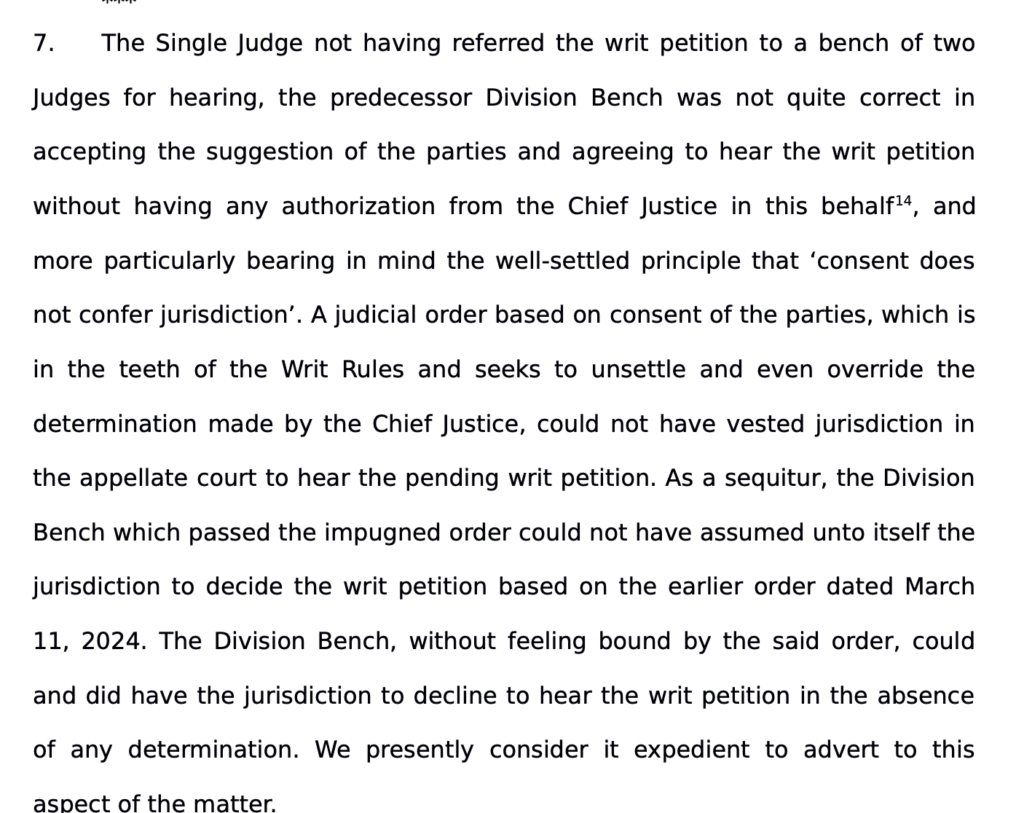
SC: Lands acquired by state cannot be transferred again by it under agreement
In Delhi Agricultural Marketing Board (Petitioner) vs. Bhagwan Devi (Respondent), the SC held that once the government, under its sovereign power of eminent domain, acquires land for a stated purpose, it has no power to retransfer it through agreement.
The facts of the case were that the government had acquired 33 acres of land, including the Respondent’s property of 6 bighas and 10 biswas, under the Land Acquisition Act, 1894, to enable the Delhi Agricultural Marketing Board to establish its grain market in Narela. Compensation was awarded, and possession was transferred to the Board in 1986. However, the respondent challenged the acquisition in 1987.
In 1988, the Board, through its chairman, made a private agreement with the respondent, returning half of the acquired land in exchange for compensation. However, this decision was later reconsidered when the Board realized that the land was still legally vested with the government and could not be returned in this manner. The Board sought to invalidate the agreement, but the respondent pursued arbitration, leading to an award in her favour in 2007.
The Board challenged the arbitral award under the Arbitration and Conciliation Act, 1996, arguing that it violated public policy since land acquired for a public purpose cannot be returned through private agreements. However, the Delhi HC upheld the award in 2013, and the Board challenged the HC’s order in the SC.
The SC then ruled in favour of the Board, holding that once land is acquired and vested in the government, it cannot be transferred back privately by the beneficiary of the acquisition. The Court held that the agreement was legally void and that the arbitral award was in conflict with the fundamental policy of Indian law. Accordingly, the pertinent judgments of the lower courts were set aside.
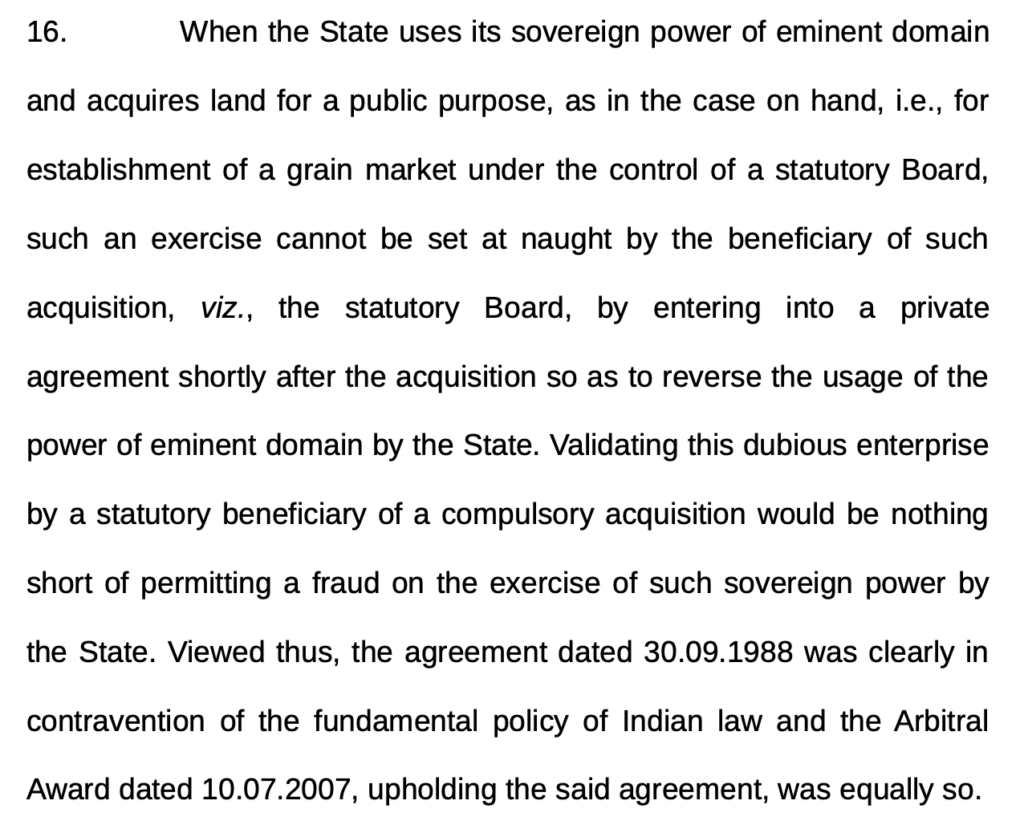
SC: Magistrate cannot direct for registration of FIR, failing compliance with section 154 (1) & (3) of CrPC
In Ranjit Singh Bath and Anr vs. Union Territory of Chandigarh and Ors, the SC held that a complainant seeking registration of FIR must first exhaust remedies under Sections 154(1) and 154(3) of the Criminal Procedure Code (CrPC), before approaching the Magistrate under Section 156(3).
The facts of the case were that the Respondent No. 2 sought the filing of an FIR against the Appellant under Sections 420 and 120-B of the IPC. For this purpose, the respondent approached a magistrate who gave a favourable order and directed the police to register an FIR. This order was upheld by the HC. The appellants challenged it before the SC, citing previous judgments of the SC, where it was held that complaints under Section 156(3) must include supporting affidavits and proof of prior efforts to register a complaint with the police in accordance with sections 154 (1) and 154 (3).
The SC noted that despite the non-compliance with section 154, both Magistrate and HC have overlooked it and erroneously given a favourable order to the Respondent No. 2. Therefore, it quashed the Magistrate’s order and subsequent proceedings. However, it clarified that the complainant is at liberty to pursue remedies under Section 154.
